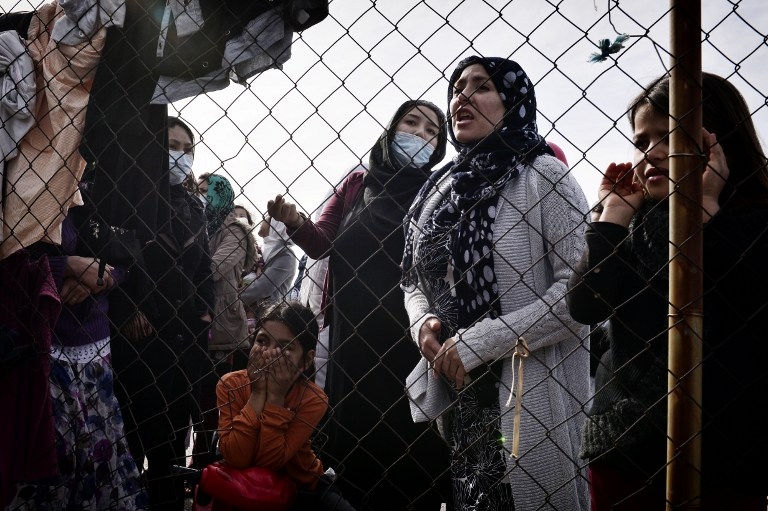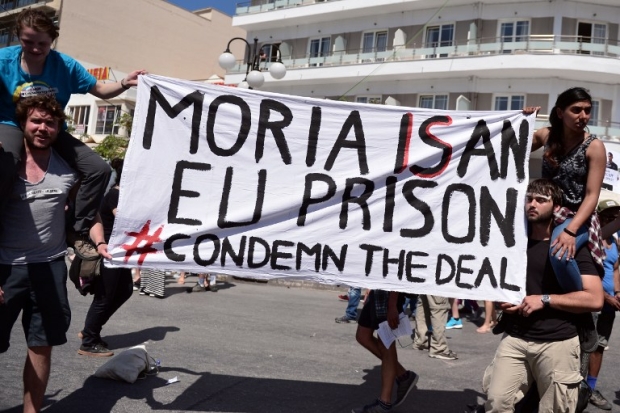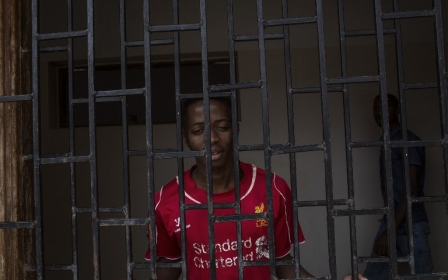Stakes high as Greek court set to decide fate of EU-Turkey migrant deal

Greece's highest administrative court is poised to decide whether Turkey can be considered a "safe country" for refugees, potentially dismantling the EU-Turkey exchange deal.
The Greek Council of State on Friday heard a case relating to two Syrian asylum-seekers who are at risk of being sent back to Turkey.
The ruling in the case, expected later this month, may set a precedent that would undermine the deal signed between the European Union and Turkey in March 2016. The deal was signed in an effort to curb migration from Turkey to Greece, and then onward throughout Europe.
According to the arrangement, Greece and the EU do not need to evaluate the individual protection needs of those arriving via the Aegean Sea, as Turkey is considered safe enough for the migrants to be relocated there. Under the deal, the Greek government set up an accelerated border procedure so that authorities could send refugees back to Turkey.
The two Syrians are challenging the notion that Turkey could be deemed a "safe third country" or "first country of asylum". They had filed a request for asylum that was turned down in Greece on the basis of the EU-Turkey agreement, and thus they could be forcibly returned to Turkey.
"In order to consider a country safe, that country needs to satisfy some requirements and give protection equivalent to the standards set out in the Geneva Convention," said Eva Cosse, Western Europe researcher at Human Rights Watch.
That means that the country is either not producing refugees of its own, or is safe enough for refugees to live there free of danger.
"The lawyers following the case tried to show that Turkey does not grant enough protection to Syrian refugees," Cosse told Middle East Eye.
In fact, Syrians cannot even register as refugees in Turkey, since they are only granted temporary protection. "And the temporary protection is not equivalent to refugee status, it can be withdrawn at any time," Cosse said.
"Syrians in Turkey do not always have access to health care, education or other services."
Prior to June 2016, Greek asylum appeal committees consistently ruled in favour of the asylum seekers and that Turkey was not a safe country.
However, after pressure from the EU, these committees' members were replaced with judges more likely to rule the opposite.
"Their composition was changed following intense political pressure from the EU on Greece," Cosse told MEE.
Lawyers have challenged the constitutionality and independence of the post-June committees in front of the Greek Council of State. They argue that the same administrative judges that have to rule on the appeal committees are also sitting in the courts that have to review those decisions. Similar concerns had been raised by former members of the appeal committees.
To be considered a safe country, Turkey should also respect the principle of non-refoulement, or the practice of not forcing refugees to return to a country where their safety cannot be guaranteed.
The attorneys shared evidence on Friday that Turkey has consistently pushed refugees back into Syria, including these two unidentified asylum-seekers.
"The two Syrians [had] been rejected three times at the Turkish border," Cosse told MEE.
The Greek state counter-arguments were based on Turkish government claims and diplomatic assurances that the country is safe enough for migrants and that it will address human rights concerns.
"Reassurances to the European Union and diplomatic letters are not enough," the Syrians' lawyers said.
Those assessing the fate of the Syrian refugees should personally ascertain whether asylum seekers can live safely in Turkey and receive enough protections, they argued.
"If Turkey is not safe enough, where will the three million refugees living there go then?" the president of the State Council asked at the end of the hearing.
"They will come to Greece and they will be stuck here," the Greek state lawyers answered, raising fears of another huge influx of migrants in a country that is already struggling to provide services.
High stakes ruling
The pressure on the State Council is high, and the ruling could have significant consequences.
The State Council may rule that Turkey is not safe enough for all refugees, setting a precedent that could negate the premises of the EU-Turkey deal.
The verdict may also rule solely on the case of these two asylum seekers and decide that Turkey is not safe enough for these individuals, thus leaving the door open for further claims.
The human rights lawyers assisting the Syrians are hoping for a third option, that the State Council might defer the case to the European Court of Justice, asking for a clear definition of a "safe country".
“It would force political actors and institutions to take a position on the matter,” Cosse said. The UN High Commissioner for Human Rights and other institutions have been silent so far, trying to avoid criticising Turkey or making judgement on whether Turkey, which has taken in the largest number of Syrian refugees, is actually a safe host country.
If the State Council or the European Court of Justice rule that Syrian refugees cannot live safely in Turkey, the EU-Turkey deal may crumble and the legal consequences of the ruling would be far-reaching for asylum-seekers.
On the other side, a ruling that deems the country safe for refugees may crush their hopes of staying in Europe, paving the way for their forced removal back to Turkey.
Middle East Eye propose une couverture et une analyse indépendantes et incomparables du Moyen-Orient, de l’Afrique du Nord et d’autres régions du monde. Pour en savoir plus sur la reprise de ce contenu et les frais qui s’appliquent, veuillez remplir ce formulaire [en anglais]. Pour en savoir plus sur MEE, cliquez ici [en anglais].





